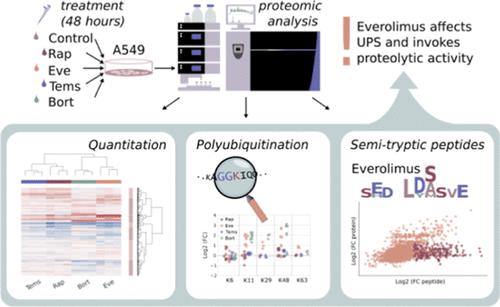当前位置:
X-MOL 学术
›
ACS Pharmacol. Transl. Sci.
›
论文详情
Our official English website, www.x-mol.net, welcomes your feedback! (Note: you will need to create a separate account there.)
Chemical Proteomics Reveals that the Anticancer Drug Everolimus Affects the Ubiquitin–Proteasome System
ACS Pharmacology & Translational Science Pub Date : 2024-02-07 , DOI: 10.1021/acsptsci.3c00316 Anna A. Lobas 1 , Amir Ata Saei 2, 3, 4 , Hezheng Lyu 2 , Roman A. Zubarev 2, 5 , Mikhail V. Gorshkov 1
ACS Pharmacology & Translational Science Pub Date : 2024-02-07 , DOI: 10.1021/acsptsci.3c00316 Anna A. Lobas 1 , Amir Ata Saei 2, 3, 4 , Hezheng Lyu 2 , Roman A. Zubarev 2, 5 , Mikhail V. Gorshkov 1
Affiliation

|
Rapamycin is a natural antifungal, immunosuppressive, and antiproliferative compound that allosterically inhibits mTOR complex 1. The ubiquitin–proteasome system (UPS) responsible for protein turnover is usually not listed among the pathways affected by mTOR signaling. However, some previous studies have indicated the interplay between the UPS and mTOR. It has also been reported that rapamycin and its analogs can allosterically inhibit the proteasome itself. In this work, we studied the molecular effect of rapamycin and its analogs (rapalogs), everolimus and temsirolimus, on the A549 cell line by expression proteomics. The analysis of differentially expressed proteins showed that the cellular response to everolimus treatment is strikingly different from that to rapamycin and temsirolimus. In the cluster analysis, the effect of everolimus was similar to that of bortezomib, a well-established proteasome inhibitor. UPS-related pathways were enriched in the cluster of proteins specifically upregulated upon everolimus and bortezomib treatments, suggesting that both compounds have similar proteasome inhibition effects. In particular, the total amount of ubiquitin was significantly elevated in the samples treated with everolimus and bortezomib, and analysis of the polyubiquitination patterns revealed elevated intensities of the ubiquitin peptide with a GG modification at the K48 residue, consistent with a bottleneck in proteasomal protein degradation. Moreover, the everolimus treatment resulted in both ubiquitin phosphorylation and generation of a significant amount of semitryptic peptides, illustrating the increase in the protease activity. These observations suggest that everolimus affects the UPS in a unique way, and its mechanism of action is different from that of its close chemical analogs, rapamycin and temsirolimus.
中文翻译:

化学蛋白质组学揭示抗癌药物依维莫司影响泛素-蛋白酶体系统
雷帕霉素是一种天然抗真菌、免疫抑制和抗增殖化合物,可变构抑制 mTOR 复合物 1。负责蛋白质周转的泛素-蛋白酶体系统 (UPS) 通常未列在受 mTOR 信号传导影响的途径中。然而,之前的一些研究已经表明 UPS 和 mTOR 之间的相互作用。也有报道称雷帕霉素及其类似物可以变构抑制蛋白酶体本身。在这项工作中,我们通过表达蛋白质组学研究了雷帕霉素及其类似物(雷帕霉素)、依维莫司和替西罗莫司对 A549 细胞系的分子作用。差异表达蛋白的分析表明,细胞对依维莫司治疗的反应与雷帕霉素和替西罗莫司的细胞反应显着不同。在聚类分析中,依维莫司的作用与硼替佐米(一种成熟的蛋白酶体抑制剂)相似。UPS 相关通路在依维莫司和硼替佐米治疗后特异性上调的蛋白质簇中富集,表明这两种化合物具有相似的蛋白酶体抑制作用。特别是,用依维莫司和硼替佐米处理的样品中泛素总量显着升高,多泛素化模式分析显示,K48 残基上有 GG 修饰的泛素肽强度升高,这与蛋白酶体蛋白降解的瓶颈一致。此外,依维莫司治疗导致泛素磷酸化并产生大量半胰蛋白酶肽,说明蛋白酶活性增加。这些观察结果表明依维莫司以独特的方式影响 UPS,其作用机制不同于其密切的化学类似物雷帕霉素和替西罗莫司。
更新日期:2024-02-07
中文翻译:

化学蛋白质组学揭示抗癌药物依维莫司影响泛素-蛋白酶体系统
雷帕霉素是一种天然抗真菌、免疫抑制和抗增殖化合物,可变构抑制 mTOR 复合物 1。负责蛋白质周转的泛素-蛋白酶体系统 (UPS) 通常未列在受 mTOR 信号传导影响的途径中。然而,之前的一些研究已经表明 UPS 和 mTOR 之间的相互作用。也有报道称雷帕霉素及其类似物可以变构抑制蛋白酶体本身。在这项工作中,我们通过表达蛋白质组学研究了雷帕霉素及其类似物(雷帕霉素)、依维莫司和替西罗莫司对 A549 细胞系的分子作用。差异表达蛋白的分析表明,细胞对依维莫司治疗的反应与雷帕霉素和替西罗莫司的细胞反应显着不同。在聚类分析中,依维莫司的作用与硼替佐米(一种成熟的蛋白酶体抑制剂)相似。UPS 相关通路在依维莫司和硼替佐米治疗后特异性上调的蛋白质簇中富集,表明这两种化合物具有相似的蛋白酶体抑制作用。特别是,用依维莫司和硼替佐米处理的样品中泛素总量显着升高,多泛素化模式分析显示,K48 残基上有 GG 修饰的泛素肽强度升高,这与蛋白酶体蛋白降解的瓶颈一致。此外,依维莫司治疗导致泛素磷酸化并产生大量半胰蛋白酶肽,说明蛋白酶活性增加。这些观察结果表明依维莫司以独特的方式影响 UPS,其作用机制不同于其密切的化学类似物雷帕霉素和替西罗莫司。



























 京公网安备 11010802027423号
京公网安备 11010802027423号